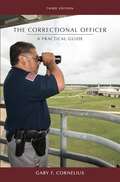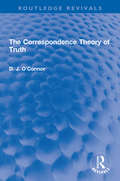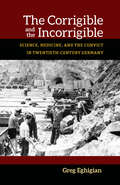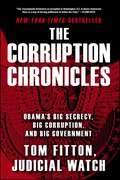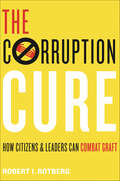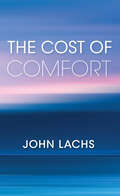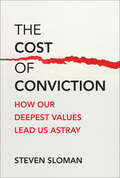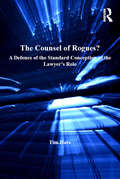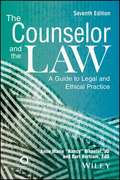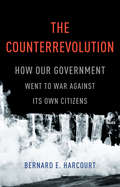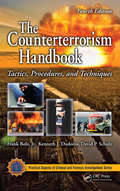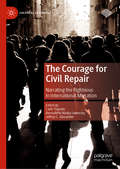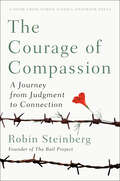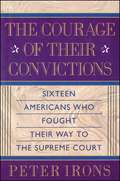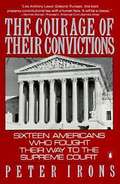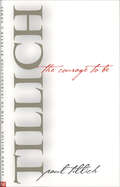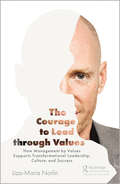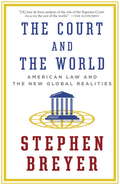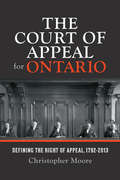- Table View
- List View
The Correctional Officer: A Practical Guide
by Gary CorneliusThe job of today's correctional officer is a demanding one, whether it is working in an adult prison or in a local jail. The correctional officer has the responsibility to safely confine criminal offenders, and, by doing so, properly keeps the public safe. This book is meant to give the reader, whether a student or a trainee, a clear, realistic understanding of what correctional officers do―from patrolling cellblocks, preventing escapes and handling security issues to dealing with various types of offenders and their behaviors. Written by a retired jail officer and adjunct professor with over 27 years of experience in confinement, classification, community corrections, correctional officer training and corrections policy development.
The Correspondence Theory of Truth (Routledge Revivals)
by D. J. O'ConnorFirst published in 1975, The Correspondence Theory of Truth examines the simplest statements of empirical fact and establishes what we can mean when we say that such statements are true. In particular, the author has considered whether any or all of beliefs, sentences, statements, or propositions are properly said to be true or false. He proceeds to examine what we mean by the term ‘fact’ and what possible relation between facts and beliefs (or their linguistic embodiments) could be meant by the term ‘correspondence’. The second part of the book is a critical survey of important contemporary accounts of truth. The author examines Tarski’s semantic theory to see if it offers a satisfactory reconstruction of the essence of the traditional notion of correspondence, then J.L. Austin’s recent and famous version of the correspondence theory and some criticisms of it by Professor P. E. Strawson. A final chapter summarizes the viable content of the correspondence theory and suggests what problems about truth still remain for discussion if the theory is accepted. This book will be an essential read for students and scholars of Philosophy.
The Corrigible And The Incorrigible: Science, Medicine, And The Convict In Twentieth-century Germany
by Greg EghigianThe Corrigible and the Incorrigible explores the surprising history of efforts aimed at rehabilitating convicts in 20th-century Germany, efforts founded not out of an unbridled optimism about the capacity of people to change, but arising from a chronic anxiety about the potential threats posed by others. Since the 1970s, criminal justice systems on both sides of the Atlantic have increasingly emphasized security, surveillance, and atonement, an approach that contrasts with earlier efforts aimed at scientifically understanding, therapeutically correcting, and socially reintegrating convicts. And while a distinction is often drawn between American and European ways of punishment, the contrast reinforces the longstanding impression that modern punishment has played out as a choice between punitive retribution and correctional rehabilitation. Focusing on developments in Nazi, East, and West Germany, The Corrigible and the Incorrigible shows that rehabilitation was considered an extension of, rather than a counterweight to, the hardline emphasis on punishment and security by providing the means to divide those incarcerated into those capable of reform and the irredeemable.
The Corruption Chronicles: Obama's Big Secrecy, Big Corruption, and Big Government
by Tom FittonWASHINGTON'S MOST CORRUPT: PRESIDENT BARACK OBAMA FLOUTING OF FEDERAL LAW * CORRUPTION * VIOLATING CAMPAIGN FINANCE REGULATIONS * TERRORIST TIES * VOTER REGISTRATION FRAUD * GOVERNMENT CON GAMES * EXTORTION BECAUSE NO ONE IS ABOVE THE LAW! In 2008, Barack Obama made a promise to have the "most transparent administration" of any U.S. president; it was the very cornerstone of his campaign. No secrets. No masks. No smoke and mirrors. No excuses. But over the next four years, President Obama's administration would prove to be one of the most guarded and duplicitous of our time. Tom Fitton of Judicial Watch, America's largest nonpartisan government watchdog (challenging George W. Bush as well as Bill Clinton), has been investigating Obama ever since he splashed onto the national scene in 2006. Now Fitton exposes devastating secrets the Obama administration has desperately fought--even in court--to keep from the American public. For a while, the Obama stonewall seemed to be holding. Until now. And the revelations are astonishing. Judicial Watch has unearthed the truth behind such high-profile issues as the bailouts, Obamacare, Guantanamo, Obama's true ties to Bill Ayers and to the Black Panthers voting intimidation scandal, and the Constitution-defying government czars. He reveals Obama's personal war against FOX News, his real link to ACORN, and his radical Chicago connections. Through scores of smoking-gun government files, some replicated here and many unearthed after lengthy court battles, Fitton also discloses the facts of the Obama-backed $535-million loan guarantee to Solyndra, promoted by the president as a model for economic recovery--only months before its disastrous bankruptcy filing. Here too is the truth behind the gunrunning scandal, code-named Fast and Furious, which was a program generated in secrecy by the U.S. government that supplied thousands of firearms to murderous criminals in Mexico--an unconscionable act, and only one in a series of historical lows for an administration that few, if any, major media in this country dare to expose. This book details how the Obama machine is aggressively employing Chicago-style tactics to steal, if necessary, the 2012 elections. And how Judicial Watch is prepared to go to court with historic lawsuits to make sure the elections are fair and honest. Why do Obama supporters turn a blind eye to his astoundingly unethical and abusive approach to governing this country? The Corruption Chronicles boldly, honestly, and factually makes the case that the federal government is now off the rails and out of control, and has literally built its foundation on broken promises, fatal miscalculations, and a cynical manipulation of its trusting public. But it's not over. Tom Fitton and Judicial Watch are proof that the Tea Party approach to government corruption can make a difference. A grassroots group can take on the president, the Congress, and the judiciary, and finally force the government to be held accountable. The uncontestable facts are here, in The Corruption Chronicles. To see what is true, you only have to look. THE FULLY DOCUMENTED FACTS BEHIND: * The Solyndra Debacle * Obama's Watergate: Operation Fast and Furious * The Obama Administration's $20 Billion Government Extortion Scheme * The Unprecedented Threat to the Integrity of the 2012 Elections * The Czar Investigation Stonewall * The Undermining of Our Nation's Immigration Laws * 9/11 Secrets
The Corruption Chronicles: Obama's Big Secrecy, Big Corruption, and Big Government
by Tom FittonWASHINGTON'S MOST CORRUPT: PRESIDENT BARACK OBAMA FLOUTING OF FEDERAL LAW * CORRUPTION * VIOLATING CAMPAIGN FINANCE REGULATIONS * TERRORIST TIES * VOTER REGISTRATION FRAUD * GOVERNMENT CON GAMES * EXTORTION BECAUSE NO ONE IS ABOVE THE LAW! In 2008, Barack Obama made a promise to have the "most transparent administration" of any U.S. president; it was the very cornerstone of his campaign. No secrets. No masks. No smoke and mirrors. No excuses. But over the next four years, President Obama's administration would prove to be one of the most guarded and duplicitous of our time. Tom Fitton of Judicial Watch, America's largest nonpartisan government watchdog (challenging George W. Bush as well as Bill Clinton), has been investigating Obama ever since he splashed onto the national scene in 2006. Now Fitton exposes devastating secrets the Obama administration has desperately fought--even in court--to keep from the American public. For a while, the Obama stonewall seemed to be holding. Until now. And the revelations are astonishing. Judicial Watch has unearthed the truth behind such high-profile issues as the bailouts, Obamacare, Guantanamo, Obama's true ties to Bill Ayers and to the Black Panthers voting intimidation scandal, and the Constitution-defying government czars. He reveals Obama's personal war against FOX News, his real link to ACORN, and his radical Chicago connections. Through scores of smoking-gun government files, some replicated here and many unearthed after lengthy court battles, Fitton also discloses the facts of the Obama-backed $535-million loan guarantee to Solyndra, promoted by the president as a model for economic recovery--only months before its disastrous bankruptcy filing. Here too is the truth behind the gunrunning scandal, code-named Fast and Furious, which was a program generated in secrecy by the U.S. government that supplied thousands of firearms to murderous criminals in Mexico--an unconscionable act, and only one in a series of historical lows for an administration that few, if any, major media in this country dare to expose. This book details how the Obama machine is aggressively employing Chicago-style tactics to steal, if necessary, the 2012 elections. And how Judicial Watch is prepared to go to court with historic lawsuits to make sure the elections are fair and honest. Why do Obama supporters turn a blind eye to his astoundingly unethical and abusive approach to governing this country? The Corruption Chronicles boldly, honestly, and factually makes the case that the federal government is now off the rails and out of control, and has literally built its foundation on broken promises, fatal miscalculations, and a cynical manipulation of its trusting public. But it's not over. Tom Fitton and Judicial Watch are proof that the Tea Party approach to government corruption can make a difference. A grassroots group can take on the president, the Congress, and the judiciary, and finally force the government to be held accountable. The uncontestable facts are here, in The Corruption Chronicles. To see what is true, you only have to look. THE FULLY DOCUMENTED FACTS BEHIND: * The Solyndra Debacle * Obama's Watergate: Operation Fast and Furious * The Obama Administration's $20 Billion Government Extortion Scheme * The Unprecedented Threat to the Integrity of the 2012 Elections * The Czar Investigation Stonewall * The Undermining of Our Nation's Immigration Laws * 9/11 Secrets
The Corruption Cure: How Citizens & Leaders Can Combat Graft
by Robert I. RotbergWhy leadership is key to ending political and corporate corruption globallyCorruption corrodes all facets of the world's political and corporate life, yet until now there was no one book that explained how best to battle it. The Corruption Cure provides many of the required solutions and ranges widely across continents and diverse cultures—putting some thirty-five countries under an anticorruption microscope—to show exactly how to beat back the forces of sleaze and graft.Robert Rotberg defines corruption theoretically and practically in its many forms, describes the available legal remedies, and examines how we know and measure corruption's presence. He looks at successful and unsuccessful attempts to employ anticorruption investigative commissions to combat political theft and venal behavior. He explores how the globe's least corrupt nations reached that exceptional goal. Another chapter discusses the role of civil society in limiting corruption. Expressed political will through determined leadership is a key factor in winning all of these battles. Rotberg analyzes the best-performing noncorrupt states to show how consummate leadership made a telling difference. He demonstrates precisely how determined leaders changed their wildly corrupt countries into paragons of virtue, and how leadership is making a significant difference in stimulating political anticorruption movements in places like India, Croatia, Honduras, and Lebanon. Rotberg looks at corporate corruption and how it can be checked, and also offers an innovative fourteen-step plan for nations that are ready to end corruption.Curing rampant corruption globally requires strengthened political leadership and the willingness to remake national political cultures. Tougher laws and better prosecutions are not enough. This book enables us to rethink the problem completely—and solve it once and for all.
The Cosmopolitan First Amendment
by Timothy ZickWe live in an interconnected world in which expressive and religious cultures increasingly commingle and collide. In a globalized and digitized era, we need to better understand the relationship between the First Amendment to the United States Constitution and international borders. This book focuses on the exercise and protection of cross-border and beyond-border expressive and religious liberties, and on the First Amendment's relationship to the world beyond US shores. It reveals a cosmopolitan First Amendment that protects cross-border conversation, facilitates the global spread of democratic principles, recognizes expressive and religious liberties regardless of location, is influential across the world, and encourages respectful engagement with the liberty regimes of other nations. The Cosmopolitan First Amendment is the product of historical, social, political, technological and legal developments. It examines the First Amendment's relationship to foreign travel, immigration, cross-border communication and association, religious activities that traverse international borders, conflicts among foreign and US speech and religious liberty models, and the conduct of international affairs and diplomacy.
The Cost of Accidents
by Guido CalabresiAccident law is currently under review throughout the United States, and indeed the world, as present systems prove increasingly inadequate to handle the mounting costs of automobile accidents. In this pioneering work, Guido Calabresi develops a framework for evaluating different systems of accident law. Defining the goal of accident law as the maximum reduction of accident and accident avoidance costs that can be achieved fairly, he examines ten political and economic choices implied in various approaches to reducing these costs. Calabresi then considers two fundamental problems all systems of accident law must face: who should be held responsible for accident costs, and how should they be valued? He analyzes the fault-insurance system now widely used and finds it wanting on grounds both of cost reduction objectives and fairness. In conclusion, he discusses recent proposals for reform of the law, points out questions they raise, and ends by indicating the two he thinks most likely to prevail and the fundamental conflict between them."Calabresi's book is most significant for its first-rate combination of modern economic analysis and legal policy. The methodology and underlying principles extend far beyond the particular subject matter of accident law to many other legal areas that could benefit from economic analysis. In turn, some economic analyses may become the richer for the discussion in this book. It is truly one of those rare important volumes."-Gerald M Meier
The Cost of Comfort (American Philosophy)
by John LachsWhy do we feel empty when our lives seem so full? A philosopher&’s &“clear, engaging reflection&” on the psychic risks of today&’s world (John T. Lysaker, author of After Emerson). While comfort has not always reached everyone evenly, most of us who live in the United States today reap the benefits of modern life. We live longer, we eat better food, we have access to good medical care, and we can stay in touch with loved ones who are far away. Yet, as philosopher John Lachs observes, these comfortable lives come at a cost: our increasing unhappiness. Irresponsible behavior, including by those in positions of power in governments and corporations, only increases and multiplies feelings of bitterness and disaffection. In this book, Lachs argues that this dizzyingly complex world often inspires isolation, and that deeper engagement with it is required in order to dispel our growing psychic distance. Lachs advocates for mediation and champions education, advertising, openness, and transparency to help individuals understand the roles they play in society and to nullify claims to blamelessness. Lachs suggests new rules for responsibility and argues that examining and understanding the consequences of one&’s actions is imperative to overcoming the ills and problems of the modern world—and to find the fulfillment we seek. &“A very clear, engaging reflection on a genuine contemporary issue: deep feelings of disengagement and bewilderment about how to live responsibly in an almost overwhelmingly complex world.&” —John T. Lysaker, author of After Emerson
The Cost of Conviction: How Our Deepest Values Lead Us Astray
by Steven SlomanA timely and important perspective on how people frame decisions and how relying on sacred values unwittingly leads to social polarization.When you are faced with a decision, do you consider the best outcome, or do you consider your deepest values about which actions are appropriate? The Cost of Conviction contrasts these two primary strategies for making decisions: consequentialism or prioritizing one&’s sacred values. Steven Sloman argues that, while both modes of decision making are necessary tools for a good decision maker, people err by deploying sacred values more often than they should, especially when it comes to sociopolitical issues. As a result, we oversimplify, grow disgusted and angry, and act in ways that contribute to social polarization. In this book, Sloman provides a new understanding of today&’s societal ills and grounds that understanding in science.Drawing on historical and current examples of the two decision-making strategies in action, the author provides a thorough overview of the psychology of decision making, including work on judgment, conscious and unconscious decision-making processes, the roles of emotion, and even an analysis of habit and addiction. With its unique emphasis on sacred values, The Cost of Conviction is an eye-opening must-read for all decision makers, especially those who wish to understand judgment, social decision making, and leadership.
The Counsel of Rogues?: A Defence of the Standard Conception of the Lawyer's Role
by Tim DareThere is a widespread perception that even when lawyers are acting squarely within their roles, being good lawyers, they display the vices of dishonesty and deviousness. At the heart of the perception is the so called standard conception of the lawyer’s role according to which lawyers owe special duties to their clients which render permissible, or even mandatory, acts that would otherwise count as morally impermissible. Many have concluded that the standard conception should be set aside. This book suggests that the moral implications of the standard conception are often mischaracterised. Critics suggest that the conception requires lawyers to secure any advantage the law can be made to give. But Dare offers a moral argument for the conception, according to which it justifies a more limited and moderate sphere of professional conduct than is normally supposed, allowing lawyers to preserve their integrity while giving proper weight to the role-differentiated permissions and obligations of their roles.
The Counselor and the Law: A Guide to Legal and Ethical Practice (6th Edition)
by Anne Marie Wheeler Burt BertramAttorney Wheeler, who has experience with counselors and the mental health field, and Bertram, a counselor, marriage and family therapist, and counselor educator, help counselors and other mental health professionals understand the legal and ethical dilemmas that can arise in practice. They overview the counseling profession, counseling relationship, and law and ethics, and discuss federal and state laws; civil malpractice liability and licensure board complaints; confidentiality, privilege, and privacy; duties to report, warn, or protect; suicide and threats of harm to self; professional boundaries; records and documentation; and managing the counseling practice. This edition has a new chapter on the use of social media and other Internet-related issues, updates to the Health Insurance Portability and Accountability Act (HIPAA) through the Health Information Technology for Economic and Clinical Health (HITECH) Act and regulations, a new legal/ethical decision-making model, and discussion of legal risks for counselor educators, such as recent court cases involving students' work with lesbian, gay, bisexual, and transgender clients.
The Counselor and the Law: A Guide to Legal and Ethical Practice (Seventh Edition)
by Anne Marie Wheeler Burt BertramIn this seventh edition of The Counselor and the Law, each chapter has been updated to reflect changes in the 2014 ACA Code of Ethics, findings of recent court cases, and new federal and state legislation. Attorney Nancy Wheeler and Burt Bertram, a private practitioner and counselor educator, provide a comprehensive overview of the law as it pertains to counseling practice; an in-depth look at counselors legal and ethical responsibilities; and an array of risk management strategies. Written in a clear and engaging style, this text is not only a widely used and respected resource for students, it also provides real answers for clinicians who are challenged daily to act in the best interest of their clients while minimizing the chances of becoming involved in an ethical or legal complaint. The issues surrounding civil malpractice liability, licensure board complaints, confidentiality, duty to warn, suicide and threats of harm to self, professional boundaries, records and documentation, and managing a counseling practice are addressed in detail.
The Counterrevolution: How Our Government Went To War Against Its Own Citizens
by Bernard E. HarcourtA distinguished political theorist sounds the alarm about the counterinsurgency strategies used to govern AmericansMilitarized police officers with tanks and drones. Pervasive government surveillance and profiling. Social media that distract and track us. All of these, contends Bernard E. Harcourt, are facets of a new and radical governing paradigm in the United States--one rooted in the modes of warfare originally developed to suppress anticolonial revolutions and, more recently, to prosecute the war on terror.The Counterrevolution is a penetrating and disturbing account of the rise of counterinsurgency, first as a military strategy but increasingly as a way of ruling ordinary Americans. Harcourt shows how counterinsurgency's principles--bulk intelligence collection, ruthless targeting of minorities, pacifying propaganda--have taken hold domestically despite the absence of any radical uprising. This counterrevolution against phantom enemies, he argues, is the tyranny of our age. Seeing it clearly is the first step to resisting it effectively.
The Counterterrorism Handbook: Tactics, Procedures, and Techniques, Fourth Edition (ISSN)
by David P. Schulz Frank Bolz, Jr. Kenneth J. DudonisTerrorists constantly present new challenges to law enforcement, emergency response teams, security planners, and others involved in counterterrorism. Since the last edition of this volume was published, additional atrocities have occurred and new threats have surfaced. The fourth edition of The Counterterrorism Handbook: Tactics, Procedures, and Techniques provides the latest developments and offers new insights on the War on Terror.Updated to reflect an increased focus on terrorism in public transportation, this volume provides an understanding of the strategies, tactics, and techniques required to tackle terrorism as it exists today. It illustrates essential topics such as the elements common to all terrorism, bomb threats, risk assessment, hostages, and weapons of mass destruction. It also presents case studies of some of the most notorious terrorist incidents, including both World Trade Center attacks, Oklahoma City, Centennial Olympic Park, the U.S. Embassy, the U.S.S. Cole, and attacks in Madrid, London, and Glasgow.The only way to effectively deal with terrorism is to have a thorough understanding of its present-day characteristics — who is involved and what weapons and tactics they are likely to use. In language friendly to first responders, this volume presents a comprehensive strategy of how to deal with a whole gamut of possible terrorist incidents. Covering everything from bombings and hostage-taking to nuclear terrorism, the book describes in specific detail what needs to be done before, during, and after an event. Armed with this information, those charged with protecting the public will be better equipped to face myriad threats.
The Couple in the Photo: The gripping summer thriller about secrets, murder and friends you can't trust
by Helen Cooper'What a wild ride!' Reader review ⭐⭐⭐⭐⭐'Wow!... A page-turning domestic suspense that will keep you on the edge of your seat' Reader review ⭐⭐⭐⭐⭐'I inhaled it in one day... Fast-paced mystery with many twists and turns... I was guessing until the final few pages how all of the threads came together. I absolutely could not put it down' Reader review ⭐⭐⭐⭐⭐They're your best friends.Lucy and her husband do everything with their closest friends Cora and Scott. They've even bought a beach house together to enjoy summers with their kids. They're more than friends: they're family.They're hiding something.When a colleague passes around photographs from her honeymoon in the Maldives, Lucy is shocked to see Scott in one of the pictures, his arm around another woman.The truth will change everything.Then news breaks that the woman from the photograph has mysteriously vanished. Why was Scott there and what is he hiding?As Lucy looks for answers, her whole life begins to unravel. If the lies start here, where do they end?A totally gripping and absolutely addictive psychological thriller with a killer twist you will never see coming. Fans of Daniel Hurst, Freida McFadden and K.L Slater will be hooked from the very first page.Readers are gripped by The Couple in the Photo:'I mean, wow! Holy, moly, my head might have just spun right on off my shoulders!... This book delivers!' Reader review ⭐⭐⭐⭐⭐'EXCELLENT THRILLER... If you love thrillers, twisty stories and a great heroine, The Couple in the Photo is for you!' Reader review ⭐⭐⭐⭐⭐'A jaw dropping read which will continually shock you and the ending? Well, picture perfect!' Reader review ⭐⭐⭐⭐⭐'The very first page had me hooked and wanting more. This book was very fast-paced and I did not want to put it down. Each chapter had me guessing more and more until the end!! As soon as I thought I could guess the ending there was another twist... I read for 5 hours straight' Reader review ⭐⭐⭐⭐⭐Praise for The Couple in the Photo:'I was hooked from the first page and positively devoured this masterfully constructed tale of lies and deceit. An absolute must-read for all thriller fans: I LOVED it!' Sarah Bonner'A twisty and intriguing suspense filled with lies and secrets that will have you salivating for more. Her best yet' Mira V Shah
The Courage for Civil Repair: Narrating the Righteous in International Migration (Cultural Sociology)
by Jeffrey C. Alexander Carlo Tognato Bernadette Nadya JaworskyThis original, scholarly collection of essays investigates the intersections of large-scale international migration and solidarity-building. Unpacking how civil courage occurs, under what forms, and what sustains it, Carlo Tognato, Bernadette Nadya Jaworsky, and Jeffrey C. Alexander bring together authors to explore a new theory of the exemplary individual or collective in the recent age of “migration crises”—actors who stand against injuries or injustices toward migrants, even when it is costly or risky in a context of hostility or indifference. A resource for those interested in the triggers and safeguards of democracy and civil society, and for scholars and practitioners alike, this volume offers empirical case studies from the US, Europe, Australia, and Latin America of cross-group solidarity efforts.
The Courage of Compassion: A Journey from Judgment to Connection
by Robin Steinberg"Powerfully insightful reading." —Kirkus ReviewsHow would you like to be judged for the rest of your life by the worst thing you&’ve ever done?We all think we are compassionate just like we all think we are honest. But true compassion is not innate. Compassion for others, especially those that we don&’t know or understand, must be learned. Our lack of compassion is perhaps most extreme in the exercise of criminal justice, where a person&’s entire life, worth, and character are judged through the myopic lens of a single act. But no one, says Robin Steinberg, should be reduced to their worst moment. From the founder and CEO of The Bail Project, The Courage of Compassion unveils how we can reimagine justice through compassion. Steinberg shares her journey as a public defender, representing people at precisely that time in their lives — their own worst moment. She recounts the heart-wrenching stories of her clients and invites us to interrogate our fears and beliefs about justice and punishment. Lastly, Steinberg reveals moments when she questioned her own capacity for compassion, as well as her ability to fight for better, more humane justice from within a system that is riddled with holes and seemingly interminable problems. A gritty tale about confronting injustice and challenging ourselves to rediscover our shared humanity, The Courage of Compassion is an invitation to join Steinberg as she explores what it will take to move beyond our current justice paradigm. The criminal justice system reflects a history and power structure, but it also mirrors how we come into society and show up for one another. As she writes, the quest to improve this system will only truly begin &“when we can finally see in the faces of those ensnared and imprisoned in our legal system, ourselves. And when we can see our children, in their children.&”
The Courage of Their Convictions
by Peter H. IronsSixteen landmark civil liberties cases and the stories of the ordinary Americans who had the courage to challenge the law and test the Constitution are re-created. Issues include: school prayer, sexual privacy, political protest, pregnancy and the right to work, acts of racial and religious discrimination, and more.
The Courage of Their Convictions: Sixteen Americans Who Fought Their Way to the Supreme Court
by Peter IronsThe author makes an in-depth analysis of the Judicial System with Constitutional emphasis based on a number of true stories.
The Courage to Be: Second Edition (The Terry Lectures Series)
by Paul TillichThe imminent philosopher and theologian examines religion in light of science and philosophy in modern society. Originally published more than fifty years ago, The Courage to Be has become a classic of twentieth-century religious and philosophical thought. The great Christian existentialist thinker Paul Tillich describes the dilemma of modern man and points a way to the conquest of the prob-lem of anxiety. This edition includes a new introduction by Harvey Cox that situates the book within the theological conversation into which it first appeared and conveys its continued rele-vance in the current century.&“The brilliance, the wealth of illustration, and the aptness of personal application…make the reading of these chapters an exciting experience.&”—W. Norman Pittenger, New York Times Book Review &“The essential character of courage, for Tillich, is &“in spite of.&” We must go on striving for freedom, justice, and our faith in spite of oppositions. In this age of late capitalism, globalization, and terrorism, we all need the virtue of courage as Harvey Cox admirably argues in the foreword.&”—Nimi Wariboko, Andover Newton Theological School, Newton Centre, MA "Tillich struggled with the existential question how we may overcome the demoralizing effects, on the individual and society, of our Age of Anxiety. In this, his most popular book, Tillich gives us his deeply thought answers, and Harvey Cox provides a helpful new introduction."—Gerald Holton, Harvard University
The Courage to Lead through Values: How Management by Values Supports Transformational Leadership, Culture, and Success
by Liza-Maria NorlinAs society rapidly increases in complexity, we are in great need of sustainable leadership in accord with beliefs and values as we experience continuous changes. The Courage to Lead through Values: How Management by Values Supports Transformational Leadership, Culture, and Success is about having the courage to lead through the implementation of agreed-upon values. In addition, it's about the courage it takes to never cease doing this. However, it’s not enough to simply be aware of the importance of constantly working with values and ethics — effective leadership based on values and ethics means taking the time to actually do it. This book tackles this issue by providing you with clear examples of how to implement incorporating values and ethics in your everyday leadership. In business, you face challenges when you must choose between efficiency, analysis of results, and goals versus actively working on values and ethics. This book will argue that one doesn't need to compete with the other and it posits that one supports the other. As the world is rapidly growing in complexity and we are facing new challenges and expectations, we must find ways to achieve sustainable lives, businesses, and societies. The author strongly believes that values are the key. By using the methodology Management by Values (MBV), under the mentorship of its founder, Professor Simon L. Dolan, the book is well-anchored in research. Ten years ago, a new school was founded in a medium-sized town in Sweden -- Internationella Engelska Skolan Sundsvall. It started with a staff of 20 and 250 students. Today the staff has grown to 120 members with nearly 1100 students attending. In 2019, it was considered one of the best schools in Sweden. The principal, Pascal Brisson, in many ways epitomizes the school and its success. Through in-depth interviews with the principal and colleagues, previous staff, executives within the organization and students, the author amassed information to provide a factual and engaging story of the school’s journey from a leadership perspective. It becomes clear how implementing shared values and the principal’s courage to never stop actively working with values as a management tool is a recipe for the success of an organization. The book invites you into a conversation about leadership. It includes the author’s personal reflections on historical management methodology and on challenges of today. As you follow the ten-year journey of a successful leader in one of our society’s most complex organizations, a school, you do this in the light of Management by Values. Essentially, this book gives the reader concrete tools and examples of how to use values as a management tool. This is told through several different themes relevant to all organizations -- organizational culture, creating teams, inspiring motivation, and handling stress.
The Court and the World
by Stephen BreyerIn this original, far-reaching, and timely book, Justice Stephen Breyer examines the work of the Supreme Court of the United States in an increasingly interconnected world, a world in which all sorts of activity, both public and private--from the conduct of national security policy to the conduct of international trade--obliges the Court to understand and consider circumstances beyond America's borders. It is a world of instant communications, lightning-fast commerce, and shared problems (like public health threats and environmental degradation), and it is one in which the lives of Americans are routinely linked ever more pervasively to those of people in foreign lands. Indeed, at a moment when anyone may engage in direct transactions internationally for services previously bought and sold only locally (lodging, for instance, through online sites), it has become clear that, even in ordinary matters, judicial awareness can no longer stop at the water's edge. To trace how foreign considerations have come to inform the thinking of the Court, Justice Breyer begins with that area of the law in which they have always figured prominently: national security in its constitutional dimension--how should the Court balance this imperative with others, chiefly the protection of basic liberties, in its review of presidential and congressional actions? He goes on to show that as the world has grown steadily "smaller," the Court's horizons have inevitably expanded: it has been obliged to consider a great many more matters that now cross borders. What is the geographical reach of an American statute concerning, say, securities fraud, antitrust violations, or copyright protections? And in deciding such matters, can the Court interpret American laws so that they might work more efficiently with similar laws in other nations?While Americans must necessarily determine their own laws through democratic process, increasingly, the smooth operation of American law--and, by extension, the advancement of American interests and values--depends on its working in harmony with that of other jurisdictions. Justice Breyer describes how the aim of cultivating such harmony, as well as the expansion of the rule of law overall, with its attendant benefits, has drawn American jurists into the relatively new role of "constitutional diplomats," a little remarked but increasingly important job for them in this fast-changing world. Written with unique authority and perspective, The Court and the World reveals an emergent reality few Americans observe directly but one that affects the life of every one of us. Here is an invaluable understanding for lawyers and non-lawyers alike.From the Hardcover edition.
The Court and the World: American Law and the New Global Realities
by Stephen BreyerIn this original, far-reaching, and timely book, Justice Stephen Breyer examines the work of the Supreme Court of the United States in an increasingly interconnected world, a world in which all sorts of activity, both public and private--from the conduct of national security policy to the conduct of international trade--obliges the Court to understand and consider circumstances beyond America's borders. It is a world of instant communications, lightning-fast commerce, and shared problems (like public health threats and environmental degradation), and it is one in which the lives of Americans are routinely linked ever more pervasively to those of people in foreign lands. Indeed, at a moment when anyone may engage in direct transactions internationally for services previously bought and sold only locally (lodging, for instance, through online sites), it has become clear that, even in ordinary matters, judicial awareness can no longer stop at the water's edge. To trace how foreign considerations have come to inform the thinking of the Court, Justice Breyer begins with that area of the law in which they have always figured prominently: national security in its constitutional dimension--how should the Court balance this imperative with others, chiefly the protection of basic liberties, in its review of presidential and congressional actions? He goes on to show that as the world has grown steadily "smaller," the Court's horizons have inevitably expanded: it has been obliged to consider a great many more matters that now cross borders. What is the geographical reach of an American statute concerning, say, securities fraud, antitrust violations, or copyright protections? And in deciding such matters, can the Court interpret American laws so that they might work more efficiently with similar laws in other nations?While Americans must necessarily determine their own laws through democratic process, increasingly, the smooth operation of American law--and, by extension, the advancement of American interests and values--depends on its working in harmony with that of other jurisdictions. Justice Breyer describes how the aim of cultivating such harmony, as well as the expansion of the rule of law overall, with its attendant benefits, has drawn American jurists into the relatively new role of "constitutional diplomats," a little remarked but increasingly important job for them in this fast-changing world. Written with unique authority and perspective, The Court and the World reveals an emergent reality few Americans observe directly but one that affects the life of every one of us. Here is an invaluable understanding for lawyers and non-lawyers alike.From the Hardcover edition.
The Court of Appeal for Ontario
by Christopher MooreIn Christopher Moore's lively and engaging history of the Court of Appeal for Ontario, he traces the evolution of one of Canada's most influential courts from its origins as a branch of the lieutenant governor's executive council to the post-Charter years of cutting-edge jurisprudence and national influence.Discussing the issues, personalities, and politics which have shaped Ontario's highest court, The Court of Appeal for Ontario offers appreciations of key figures in Canada's legal and political history - including John Beverly Robinson, Oliver Mowat, Bora Laskin, and Bertha Wilson - and a serious examination of what the right of appeal means and how it has been interpreted by Canadians over the last two hundred years. The first comprehensive history of the Ontario Court of Appeal, Moore's book is the definitive and eminently readable account of the court that has been called everything from a bulwark against tyranny to murderer's row.
